INTRODUCTION
The migration crisis, though less frequently headlined in recent years, remains a pivotal issue influencing political discourse across the globe. Leaders and commentators from various countries have articulated their perspectives on how migration impacts national security, cultural integrity, and societal stability. The speeches of Dominik Tarczyński, Eva Vlaardingerbroek, Suella Braverman, Donald Trump, Viktor Orbán, Hans-Georg Maaßen, and Balázs Hidvéghi provide a comprehensive overview of the conservative stance on migration not only within Europe but also in the United States.
Dominik Tarczyński: A Firm Stand from Poland
Dominik Tarczyński, a Member of the European Parliament from Poland, emphasizes his country’s zero-tolerance policy towards illegal migration. He credits this approach with keeping Poland free from terrorist attacks and other crimes associated with illegal migrants. Tarczyński criticizes Angela Merkel’s quota system for distributing migrants across EU countries and underscores Poland’s commitment to rejecting this system. He advocates for the deportation of undocumented migrants, arguing that those destroying their passports and fingerprints are already engaging in criminal behaviour.
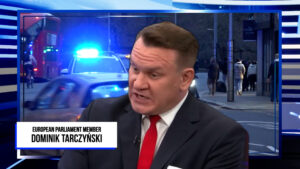
Eva Vlaardingerbroek: The Persistent Crisis
Dutch commentator Eva Vlaardingerbroek highlights that the migrant crisis, although less prominent in the media today, continues to be a significant challenge for Europe. She points to recent electoral victories by right-wing parties in Sweden and Italy as evidence of a growing public backlash against unchecked migration. Vlaardingerbroek suggests that the consequences of the 2015 crisis are still unfolding, impacting the socio-political landscape across the continent.
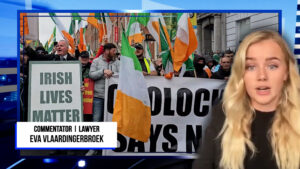
Suella Braverman: A Call for Sovereignty and Security
UK Member of Parliament Suella Braverman criticizes the influence of the European Convention on Human Rights, suggesting it hampers national governments’ ability to secure borders and maintain public safety. She argues for a conservative approach to governance that prioritizes the will of the people over the decisions of unelected judges and activists. Braverman warns that failing to address issues like illegal migration through democratic means could lead to social unrest and the rise of extremist solutions.
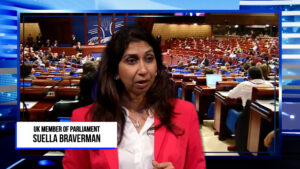
Donald Trump: An American Perspective
Former U.S. President Donald Trump’s speech reinforces a hardline stance on migration, reflecting his administration’s policies of banning refugees from specific countries deemed high-risk for terrorism. Trump advocates for stringent ideological screening of immigrants and promises a large-scale deportation effort to remove those he considers a threat to national security. His policies aimed to ensure that those entering the United States align with the country’s values and do not pose a risk to its citizens.
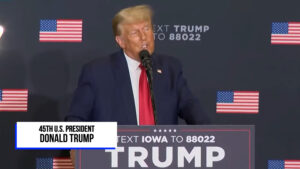
Viktor Orbán: Hungary’s Border Policy
Hungarian Prime Minister Viktor Orbán reiterates his country’s strict immigration policies, which require migrants to apply for entry from outside Hungary. He describes illegal border crossing as a crime rather than a human right and insists that controlling migration is essential for maintaining national sovereignty. Orbán argues that if all European countries adopted similar policies, the migration crisis could be effectively managed.
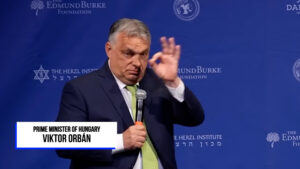
Hans-Georg Maaßen: Asylum Policies and Protection
Hans-Georg Maaßen, a former head of Germany’s domestic intelligence service, challenges the current asylum policies in Germany. He contends that most asylum seekers are not politically persecuted and thus do not qualify for asylum. Maaßen emphasizes the importance of protecting the nearest safe country, rather than allowing migrants to travel to Germany or other distant nations.
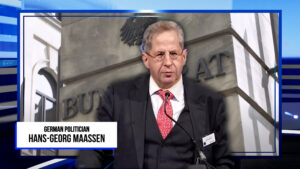
Balázs Hidvéghi: Preserving European Identity
Balázs Hidvéghi, another Member of the European Parliament, frames the migration debate as a struggle to preserve European identity and cultural norms. He argues that mass migration leads to societal disintegration and public safety issues, citing increased violence in Western European cities as evidence. Hidvéghi calls for a rejection of illegal mass migration to protect the social fabric and maintain public order.
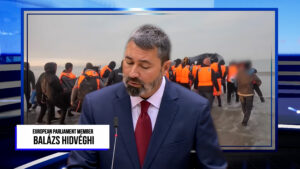
Conclusion
The conservative leaders and commentators share a common concern: the need to control migration to preserve national security, cultural integrity, and societal stability. From Europe to the United States, they criticize existing policies and call for stricter measures to prevent illegal migration. Their speeches reflect a broader trend towards nationalism and a desire to prioritize the sovereignty and will of their respective nations. As the world continues to grapple with migration challenges, these voices advocate for policies that they believe will safeguard the future of their countries and maintain order in an increasingly interconnected world.
Watch our Video here: https://youtu.be/4hENeWfG_DY
